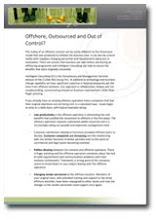It’s business as usual as a sense of relief washes over the UK PLC. The Financial Services sector is particularly reassured, as it will now be spared a bank run, the difficulty of adapting to trading in different currencies, the loss of the big corporates’ headquarters back below Hadrian’s Wall and a loss of faith in the pound from foreign investors. But the UK must not mistake relief for a sense of anti-climax; this decision will mean change.
David Cameron has promised that a ‘devolution revolution’ is to follow, but as the debate about which powers will be devolved to Scotland begins, we can expect a significant impact on employment, and potentially on contractors. I anticipate a degree of uncertainty in our field as the politicians begin to establish a framework around which decisions will lie with the Union and which with Westminster.
Despite this, the rejection of independence is good news for recruiters and the job market across the UK. Had it been a ‘Yes’ vote we would likely have experienced a spike in contractor usage, although the short term boosts which the world of recruitment could have expected would have quickly been eroded by the potential long term economic impacts of separation.
But the ‘No’ vote doesn’t mean no change. Hours before the votes were counted, Gordon Brown stated that Scotland “want a promise of change they can trust – without the risks and uncertainties of an irreversible separation”. And never before has such an accurate representation of a nation’s opinion been captured; an enormous 84.6% of Scots voted (a level of engagement rivalled only by universal suffrage and the 1950 general election), and the referendum has “touched sections of the community who have never before been touched by politics”. With this many people calling for change, a realignment of our national values with this emerging attitude will be inevitable.
But some are questioning whether or not these issues are merely delayed. Although Salmond has stated that Scottish independence will now be ‘off the agenda for a generation’, the proximity of this morning’s result was so close that a second referendum is far from impossible, according to The Guardian’s economic editor Larry Elliott. He also speculated that in the few weeks and months following this decision, a minority the big corporates who were poised for change may not want to waste their preparation efforts. As the outcome was so close, some companies may choose to move south into England anyway, choosing to go ahead with their contingency plans. Everyone is feeling the need for change.
Overall, most of the UK can breathe a sigh of relief, for the time being. This is, in my opinion, good news for England and Wales, for Scotland, employers and recruiters. We are now in a position to create some long term solutions to our national concerns, and continue the consistent recovery from recession which we are currently enjoying.
Nick Walrond, Managing Director







No comments:
Post a Comment